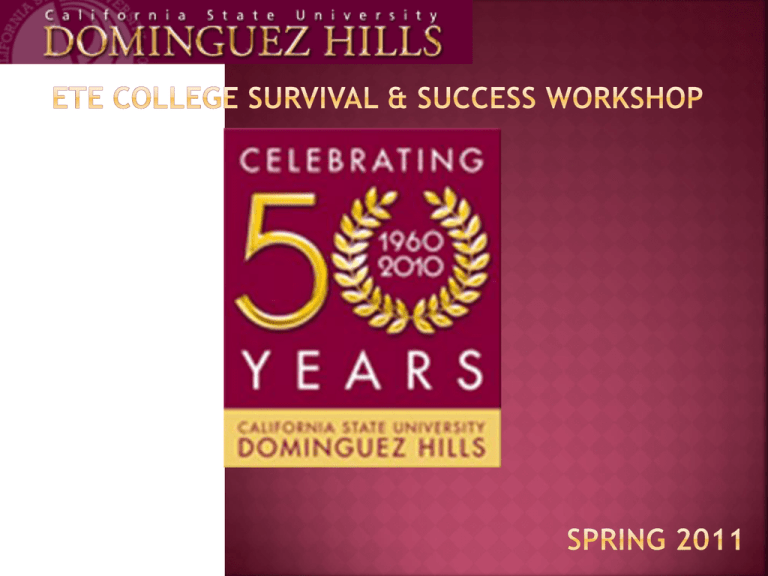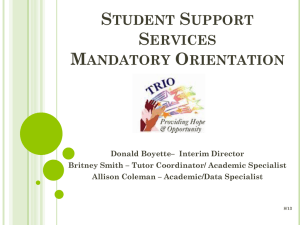College Survival and Success Workshop
advertisement

Time Management Tips College Study Skills Tips Social Media Etiquette •Facebook •Email Reminders •Attend Tutoring •Meet w/ Peer Mentor Student Evaluation Learning How to Manage Your Time in College Can Be Critical for Your Success Within the first few days of starting college, many students quickly learn that managing their time is one of the most challenging -and difficult -- aspects of being in school. With so much to do and keep track of, strong time management skills can make all the difference. Get -- and use -- a calendar. It can be a paper calendar. It can be your cell phone. It can be a PDA. No matter what kind it is, though, make sure you have one. Write down everything. Write down everything in one place. (Having multiple calendars just gives you more to do amidst an already tight schedule.) Schedule when you plan to sleep, when you are going to do your laundry, when you're going to call your parents. The crazier your schedule gets, the more important this becomes. Schedule time to relax. Don't forget to schedule in time to relax and breathe. Just because your calendar goes from 7:30 a.m. to 10:00 p.m. doesn't mean you can. Keep trying new systems. If your cell phone calendar isn't big enough, buy a paper one. If your paper one keeps getting torn, try a PDA. If you have too many things written down each day, try color-coding to help simplify. Very few college students make it through their programs without some kind of calendaring system; keep trying until you find one that works for you. *Examples Allow for flexibility. Things inevitably come up that you weren't expecting. You may not have known that your roommate's birthday is this week, and you certainly don't want to miss the celebrations! Maybe your family has decided to go out of town for the weekend or an emergency comes up. Leave room in your calendar so that you can move things around a little when needed. Plan ahead. Do you have a large research paper due the last week of the semester? Work backward in your calendar and figure out how much time you need to write it, how much time you'll need to research it, and how much time you'll need to pick your topic. If you think you'll need six weeks for the entire project, work backward from the due date and schedule the time into your calendar before it's too late. Plan for the unexpected. Sure, you just might be able to pull off two papers and a presentation during mid-terms week. But what happens if you catch the flu the night you're supposed to be pulling the allnighter? Expect the unexpected so you don't have to spend more unplanned time trying to fix your mistakes. Schedule rewards in. Your mid-terms week is a nightmare, but it will all be over Friday by 2:30. Schedule a fun afternoon and a nice dinner out with some friends; your brain will need it, and you can relax knowing that you're not supposed to be doing anything else. Tips for Using Your Agenda: •Color-code different classes, work, etc. •Use colored pens, highlighters, WiteOut to keep your agenda in order. •Take out the syllabus for one of your classes. •Fill in the hours each week when you have class. •Write in when all of your quizzes, mid-terms, & finals will be taking place. •Write in the due dates for any other course assignments. •Write in the hours that you will attend tutoring. •Write in the hours each day that you will dedicate to studying and which class(es) you will be studying for. •Write in the hours you will be working, taking care of family matters, etc. •Write in any important events like birthdays, family trips, etc. that will take place this semester. Study at the Library. The college library is one of the most loathed places to go on campus, especially by the end of the semester. Resist this urge to hate the library, because it can actually give you more time to have fun. Instead of trying to study in a dorm or at home where there are constant distractions, college students should study in the library where they are most efficient. This will allow students to study more in less time, leaving more time to do the fun stuff. Don't become one of those college students who never steps foot inside the college library. . Surround yourself with Smart People. If you make friends and surround yourself with smart people, you will be more motivated to learn, and you will learn how to study and learn more efficiently. . Have the materials the professor requires Most professors require a specific textbook for class. Students should do their best to have the correct textbook or other materials so time is not wasted studying the wrong topics so that you are prepared to complete all course assignments. . Use the resources the professor gives you. Most professors give out handouts and articles for a reason. Students should keep everything their professor gives them just in case it is needed for a test or other assignment. The college course syllabus is an important resource that should be kept all semester as a guide. Get Back Tests. "Back Tests" are copies of tests that professors have given to students in the past such as last semester or years ago. Many professors know about this practice of studying back tests, so they have implemented practices such as changing tests completely every semester, and collecting all tests after a test is taken. Note: do not just study the answers on the back tests because if they are changed you will fail. The best practice is to write out all of the questions, and find all the answers to the questions on your own, as if you were taking an open book test. Then study the questions and answers and try to think of similar questions and variations the professor may ask. Meet with the Professor. College students who are unsure of what could be on the next test should talk to the professor before class, after class, or make an appointment. This will allow the student to speak with the professor face to face, and ask direct questions. Some professors will give you clues and ideas of what to study and how to study if you just ask. Speaking with the professor is always a bonus for the student because it shows the student is actually concerned about the class, and the professor gets to know you, which some professors consider when it comes time for grades. •Create Mnemonics •Make a Study Guide •Make Flash Cards •Quiz Yourself •Set Time Goals •Remember to Take Breaks •Don't Study Alone •Study During the Week For those college students who like to party/socialize, studying during the week is the way to go. Typically studying Monday through Thursday is the way to go. If you have time between or after classes while you are still on campus, that is the best time to pop into the library for a quick hour of studying. This will allow you to enjoy your nights without worrying about studying later. •Schedule Time for Studying College students who regularly have gaps in their class schedule should mark off those hours as study time. By making it part of the routine, students should get into the habit after a few weeks, and not even think about it. The key is to start right away and try not to cheat. College students who do not have gaps in their schedule should plan for times before or after class, or schedule time at night. •Get lots of sleep Don’t write private messages on wall posts: It’s embarrassing, rude, and makes you look immature. Edit your photo choices: Don’t put up photos of yourself or others engaging in illegal, irresponsible activities, including pictures of you chugging pitchers of beer, whether or not you’re 21. Don’t drunk-facebook: Sending drunk Facebook messages or making drunk wall posts can be funny with friends, but seriously damaging with educational and professional contacts. Be careful who you tag: Just because you don’t have a job doesn’t mean your friends are okay with having ridiculous photos of themselves posted on Facebook so that their moms and bosses can see them. Write clear status updates: People who write vague, depressing song lyrics or status updates come across as self-indulgent. Be respectful of the relationships status: Talk with your partner before changing a relationship status. If it’s good news, do you want an online medium to be the one to share it? If it’s bad, you want to make sure you’re not breaking up with someone via Facebook. Don’t cyber-stalk: If you’re never getting any responses back to the wall posts and messages you leave on someone’s profile, then you’re cyber-stalking them. Stop. Don’t send apps: Make sure that when you try out an application, you’re not sending it to everyone you’re friends with. That’s right: everyone. Stop playing the farm animal game if you want to be taken seriously: Would you want to hire someone who clearly spends all day swapping cows and feeding goats on Facebook? YOUR PRIVACY SETTINGS: Do you know how to change your Facebook Privacy Settings? Did you know that you can create multiple Facebook Profiles that can only be viewed by certain people? Have you ever considered the fact that people you don’t even know are able to view your Facebook Profile and every status update, comment, or photo you post or get tagged on? Have you ever considered the fact that your professors, advisors, parents, employers, etc. can view everything you post on Facebook? *Not seeing an important email is not an excuse. *Make sure to forward your toromail to your personal email account so you don’t miss out on important information! YOU SHOULD BE CHECKING EMAIL DAILY! Email Communication •The email address you use to communicate with school and work-related contacts should include your name and only your name. For example: poliverez@yahoo.com, paz.oliverez@yahoo.com, oliverez_paz@yahoo.com 1.Anything other than this makes it difficult for the individuals you send email to identify that a message is from you. 2.Some of the email addresses students use are simply silly or incomprehensible and can make you appear unprofessional and/or immature. *School and workrelated contacts include: Your ETE Advisor(s), other CSUDH staff, your professors, your SI’s, your employer, etc. All email messages sent to school and work-related contacts should be formatted like a formal letter. They should also be absent of grammar and spelling errors. For example: Dear Dr. O., I have a question about my class schedule and would like to schedule an appointment to meet with you. Can you please let me know when you are available? Thank you, John Smith Continue to attend required tutoring for English and math courses English: Attend 2 times per week for the remainder of the semester, or more if needed. Math: Attend 2 times per week for the remainder of the semester, or more if needed. Meet with your Peer Mentor. Attend upcoming ENGAGE activities! Check email daily! ETE Academic Advisors: Dr. Paz Oliverez (310) 243-3305 poliverez@csudh.edu Silvia Alvarez (310) 243-2759 salvarez@csudh.edu On behalf of the entire ETE program, we thank you for participating in the Spring 2011 ETE College Survival & Success Workshop. We hope that you have a successful spring semester!







